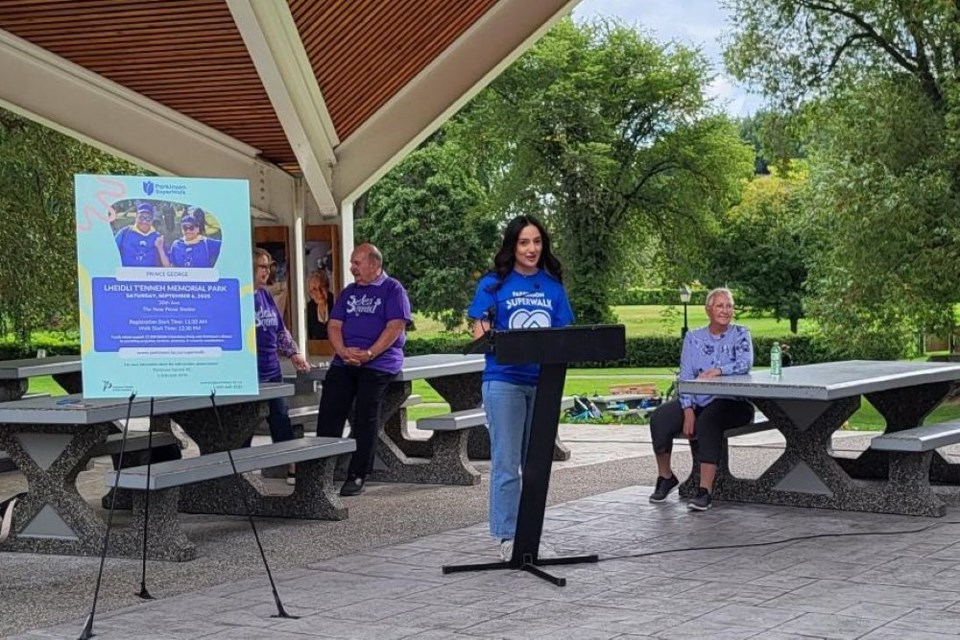Watching her neighbour struggle with shaky hands as he tried to water his garden got one Prince George teen thinking about what she could do to help on a grand scale, knowing tremors are a sign of Parkinson’s disease.
Serena Sanghera, now a UNBC student with aspirations to become a neurologist, has volunteered with the Prince George Parkinson Support group for the last six years and wants people in the North to be served by a Movement Disorders Clinic in Prince George.
This goal is motivating Sanghera’s efforts to raise awareness and funds during the Parkinson’s SuperWalk on Saturday, Sept. 6 at Lheidli T’enneh Memorial Park.
A Movement Disorders Clinic would be dedicated to the diagnosis and management of Parkinson’s disease and other related disorders, such as tremor and dystonia, just like the clinic at the University of British Columbia in Vancouver.
Parkinson’s disease is a progressive, neurodegenerative disorder caused by a loss of the cells that produce dopamine in an area of the brain called the substantia nigra. Dopamine is a brain neurotransmitter that sends signals from one nerve cell to another. It affects the parts of the brain that control smooth, voluntary movements, such as walking, writing, throwing a ball, or buttoning a shirt. There is no cure for Parkinson’s disease. Treatment can help manage symptoms and help people live a full life with the disease, but they cannot slow or reverse its progression, according to the Parkinson Society of BC website.
“So the man in my neighbourhood lives a few houses down and every time I would walk home from school he would be outside sitting on his chair wobbling and he would still be gardening,” Sanghera explained what inspired her volunteerism for the Parkinson Support Group in Prince George.
“He had so much passion and resilience and he did not let his physical disability diminish his capabilities. He had a beautiful garden, I must admit, he had florals everywhere and he would be there and shaking so hard there would be water everywhere and he didn’t care as long as he could water his plants. And I’m like ‘wow, I wonder how many other people are affected by this disease?’ So then I thought I should volunteer with this group as I always wanted to be part of community.”
She did her undergrad in biochemistry and molecular biology and through her studies was able to work with Dr. Kendra Furber in her neuroscience lab at UNBC.
“I have always been interested in neuroscience because I have a family history of Alzheimer's so my connection to neurological disease started from there as it’s genetically inherited so I might get it in the future,” Sanghera said.
“I was always interested in how the brain works and then saw how Parkinson’s affected my neighbour. Some people are ashamed they have Parkinson’s disease and are hiding it and that’s a big thing and I want to bring awareness to it.”
That way people who have the disease might be more comfortable in public, knowing they are supported, she added.
“A career in healthcare is the ultimate goal - in neurology,” Sanghera said, promising she will return to Prince George after her studies are complete.
Sanghera is on a mission to make sure there is a Movement Disorders Clinic in Prince George by 2030 to serve the 1,000 or so people in the North who have Parkinson’s disease.
“Not just in the works but established by 2030,” Sanghera said.
“We were fourth priority when Movement Disorders Clinics were established in BC. Vancouver was first, Kelowna was second and Victoria was third.”
Each was able to acquire a neurologist willing to commit to the Movement Disorders Clinic, she explained.
Sanghera said that if there was a neurologist willing to come to the north even on a quarterly basis to serve those in need it would be so helpful as travel is a barrier for many of those living with Parkinson’s disease.
“I hope we can find a neurologist willing to do this,” Sanghera said.
“I have been working with the Northern Medical Program students interested in becoming neurologists so that maybe they could have their practice here so we get more neurologists and hopefully we can have a clinic established. That’s my goal because it’s not financially possible for some people with Parkinson’s disease to travel to a clinic and physically can you imagine a 12-hour Northern Health Bus ride down to the lower mainland from Prince George and communities even further north than we are? It would be so difficult. So that’s my goal — to have a clinic by 2030.”
Northern Heath provided a statement that said 'Northern Health does not have plans for the development of a Movement Disorders Clinic in Prince George at this time. These highly specialized care centres are typically found in larger population centres such as Vancouver and Kelowna. Prince George residents can access this highly specialized care by getting a referral from their primary care provider.'
Shirley Bond was part of the organizing committee at the launch of the Prince George Parkinson SuperWalk held on Aug. 12 where she talked about the SuperWalk being the first step in raising awareness for those with Parkinson’s disease in the North.
“And step two is to continue the fight to make sure that we can have a mobility clinic here in Prince George,” Bond said.
“We are a community that steps up and supports one another and Prince George deserves to have a clinic here,” Bond said.
To participate in the Prince George SuperWalk or to donate to a team visit www.support.parkinson.bc.ca/PGSuperWalk2025.



